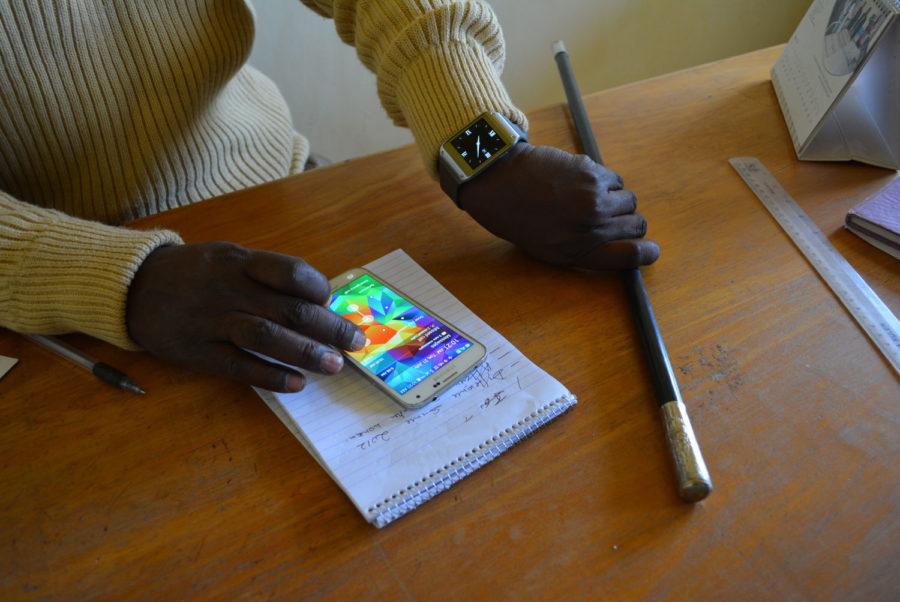Smartphone overuse may increase anxiety, depression
March 21, 2016
As the uses for smartphones continue to expand, from utilizing apps that will swap people’s faces to being used as an on-the-road credit card scanner, one use may be surprising: a safety blanket for people with anxiety or depression.
Dane Brown, an employee at a retail store in St. Joseph, Mo., understands this notion. Diagnosed with anxiety, he often retreats to his cellphone, full of comforting sights and sounds, when things get tough.
“Some of my friends see it as a problem. It’s looked at that I’m ignoring them for Facebook or Twitter because that’s kind of the perception. It don’t even have Facebook or Twitter,” he said.
Advertisement
Brown is not alone.
According to a recent study by researchers from the University of Illinois at Urbana-Champaign, a look at more than 300 college students found heavier technology use was tied to greater risk for anxiety and depression, particularly among those using the devices as a “security blanket” — to avoid dealing with unpleasant experiences or feelings.
In the study, co-author Tayana Panova stated: “Handheld devices, with their countless applications and entertainment options and their constant presence at our fingertips, make it easier than ever before to disconnect with the problems [and] stresses of reality, and avoid actively engaging with them.”
At 35 years old, Brown isn’t sure whether or not this is a problem. He said he feels, overall, his life has been better because of his smartphone because it can help calm him down.
But he also fears at times that being constantly connected to the Internet adds to the stress.
“I go back and forth because it certainly helps at times. But both because life has gotten a little tougher as I age, I’m more anxious and I feel like this [smartphone] is part of it because I’m so attached to it. If I don’t have that aid, I feel lost,” he said.
His feelings seem to mirror the results of the study. While it stated that using a smartphone doesn’t cause mental health problems and it’s fine for people simply looking to escape boredom, smartphones had an adverse effect on those using them like a comforting security blanket.
Advertisement*
“Turning to the device whenever an uncomfortable situation or feeling arises can become an escapist pattern of behavior, and may make people more vulnerable to stressors due to insufficient emotional ‘exercise,'” Panova stated in the study.
When it comes to social media, Kristina Hannon, vice president of Behavioral Health at the Family Guidance Center in St. Joseph, Mo., sees people checking their phone as a problem because of what they’re viewing. According to Kleiner Perkins Caufield & Byers’s annual Internet Trends report, people check social media on average 150 times a day.
“Whenever we start to see people engaging in that level of overuse of a smartphone, you can see signs of anxiety and depression because a lot of the information that comes through is not always positive information,” she said.
Through text messaging and social media, phones also cause a demand for instant interaction. When that’s absent, it signals in some peoples’ brains that something is wrong.
“Before, you’d leave a voicemail and that’s it. Now, you can see when they’ve been on Facebook or social media and you’re wondering ‘Why didn’t they call me back?’ ‘Are they mad at me?’ ‘What’s happened?'” Hannon said.
For people with depression and anxiety, this could be a big thing because it’s taking away an important need for everyone — actual human interaction.
“A concern with constant smartphone use is you’re eliminating your social interaction, and humans are very social creatures. We need interactions with other people for our own betterment, to communicate, to have a sense of belonging,” she said.
With technology like smartphones so ingrained in American culture, people run the risk of passing the habit of smartphone overuse to children.
Hannon said parents need to be cognizant of it.
“You can’t get all of the skills you need from a device. Even though devices are talking to children, that doesn’t promote their language and development in the sense that human interaction does,” she said.
___
(c)2016 the St. Joseph News-Press (St. Joseph, Mo.)
Visit the St. Joseph News-Press (St. Joseph, Mo.) at www.newspressnow.com/index.html
Distributed by Tribune Content Agency, LLC.
Advertisement










